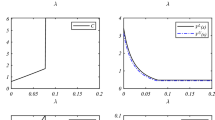Abstract.
Sustainability is usually defined as a requirement of each generation to manage its stocks of man-made and natural capital such that the utility that it ensures itself can be shared by all future generations. Here we extend this definition to the case where capital management does not have deterministic consequences. A characterization is offered where the sustainability of one generation's behavior can be determined by comparing its utility with the utility of the succeeding generation, provided that the latter behaves in a sustainable manner. The properties of the definition are investigated and illustrated.
Similar content being viewed by others
Author information
Authors and Affiliations
Additional information
Received: 26 April 1994/Accepted: 15 April 2002
Rights and permissions
About this article
Cite this article
Asheim, G., Brekke, K. Sustainability when capital management has stochastic consequences. Soc Choice Welfare 19, 921–940 (2002). https://doi.org/10.1007/s003550200188
Issue Date:
DOI: https://doi.org/10.1007/s003550200188



